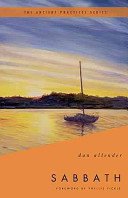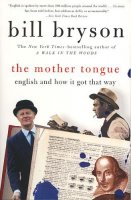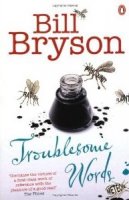 Sabbath, by Dan B. Allender (Thomas Nelson, Nashville, 2009)
Sabbath, by Dan B. Allender (Thomas Nelson, Nashville, 2009)
Mystical poets who enjoy attempting to express the inexpressible may find working through Allender's Sabbath a productive exercise, but those looking for a practical, rational discourse on how to honor the Sabbath Day will find themselves banging their heads in frustration. I know I did.
It's clear that Allender has experienced an otherworldly delight in his own celebration of the Sabbath; unfortunately, like many mystics of old, his attempts at sharing that experience fall flat. First, there is a language barrier. Poetical prose as a literary device can work, but like straight poetry it takes effort to make out the sense, and even then you're not sure you've got it right. When you're expecting an informative book, the attempt at poetic language quickly becomes annoying. (More)


The Mother Tongue: English and How It Got that Way (first published 1991, reissued by Perennial 2001) and Troublesome Words (first published 1984, revised 1997, reissued by Penguin Books 2009), both by Bill Bryson
My father and my sister-in-law became hooked on Bill Bryson as a writer; perhaps it is now my turn.
For the first twelve chapters, The Mother Tongue is an accessible, page-turning look at the English language: where it came from, why it’s so popular, and how it came to be simultaneously one of the easiest and one of the hardest languages to learn. (More)
Ride on! ride on in majesty!
Thy last and fiercest strife is nigh;
the Father on his sapphire throne
expects his own anointed Son.
I love Ride On! Ride On in Majesty! for its profound overview of Holy Week. We sang it this past Sunday, to the Winchester New tune, and as always I was especially moved by the verse above. Last year I was inspired by those words to consider the effect of Good Friday on Jesus' parents. Today I am struck by the realization that Easter was not a surprise, nor an afterthought, nor a Plan B. In the drama of Holy Week, all scenes—from Palm Sunday through Maundy Thursday, Good Friday, and Holy Saturday—point toward the finale: Easter. The Author includes some dark, excruciating (literally) moments, but the triumphant last scene is never out of His sight.
Ride on, ride on, in majesty!
In lowly pomp ride on to die;
Bow Thy meek head to mortal pain,
Then take, O God, Thy power, and reign.
Permalink | Read 2206 times | Comments (2)
Category Random Musings: [first] [previous] [next] [newest]
Music is such a personal, touchy subject—as is worship. Put them together and you might as well be mixing sulfur, charcoal, and saltpeter. Nonetheless I will boldly go where too many have gone before, in order to draw attention to “Pop Goes the Worship,” an interview in Christianity Today (March 2011) with T. David Gordon, author of Why Johnny Can’t Sing Hymns: How Pop Culture Rewrote the Hymnal.
I wasn’t expecting much when I began the article (who writes these titles, anyway?), but was quickly drawn in. A sure way to my heart is to say what I’ve been saying myself, or wanted to say, only much better and with authority. The article is worthwhile in its entirety; here are a few excerpts to whet your appetite—or raise your blood pressure. [Emphasis in the following is mine]
T. David Gordon argues that modern worship choruses have trumped hymns in many congregations because for decades, we have been inundated with pop music—to the point that many of us don't know better. If you eat nothing but Big Macs, Gordon says, you will never appreciate a filet mignon.
Regarding church music, Gordon says, media ecologists should ask how music, "once a participatory thing, became a passive thing. What happens when people who used to sing folk music around the house are now surrounded by Muzak? How does that alter our sensibilities of music?"
Many are promoting an "aesthetic" that it is our duty to patronize living artists and not artists who are dead. Should we also not read books that are more than 50 years old, or enter buildings that are more than 50 years old? Christians aren't abandoning their buildings, and they haven't stopped reading Spurgeon or Edwards or Luther or Calvin. We haven't rejected other art forms that are not new. We've done so only with music.
Unless an individual chooses to listen to different kinds of music, the only thing that individual will hear (most of the time) is pop. Sure, one's sensibilities can be shaped deliberately, and many of us have developed tastes that we once did not have. (I spent years cultivating a taste for Brahms, whom I now love, and I spent about two years cultivating my appreciation for jazz.) If I did not believe that sensibilities could be cultivated, I wouldn't have written the book; it is, in some senses, a plea to shape them differently from the way commercial pop culture shapes them. But for people who do not take ownership of the cultivation of their sensibilities, other cultural gatekeepers will shape them for them—and in this case, they will shape them to prefer pop.
It's not the New York Times, or even the Hartfort Courant, but I'll thank the East Haddam-Haddam Patch for their article on the quilt show, and their mention of Phoebe's Quilt. (H/T PJS) As is true with most newspaper articles I've known the truth about, this one manages to tell gist of the story accurately while erring in the details.
One of the most interesting ... had to be Prudence Sloane’s quilt.
“I inherited a trunk from my mother, this was in the bottom of it,” Sloane said. The quilt contained the names of family ancestors stitched into it.
It turned out the quilt belonged to Phoebe (Burr) Scovil, Sloane’s first cousin four times removed. It was most likely a wedding present from friends and family around 1849. Sewn into each square section of the quilt was a different person’s name.
Sloane’s sister-in-law, Linda Wightman, who was very interested in the family’s genealogy, did research on all the names of the people on the quilt. Wightman even went to Boston to investigate the names in a genealogy library.
Wightman made a booklet and gave it to Sloane as a Christmas present with information on Phoebe and how each person sewn into the quilt was related to her.
The quilt actually belonged to Phoebe L. (Scovil) Bonfoey, who is, indeed, Prudence's first cousin four times removed (and my fourth cousin four times removed, for that matter). Phoebe (Burr) Scovil was her mother. The creation of the quilt was most likely around 1849, the year one of the signers died and one, who signed with her married name, got married. Phoebe herself married Horace A. Bonfoey in 1852.
To say that I "even went to Boston to investigate the names in a genealogy library" sounds rather pathetic unless you realize that I, unlike the quilt, don't live in Connecticut. In any case it's not something to be impressed about; whenever I make the (all too rare) visit to Boston, New York, Hartford, or other research hot spot, it's for a lot more than just the quilt. Most of my research for this project was done using the amazing resources available online. That's not to say I couldn't have walked to Boston in the time it took me to gather the information—not true, but at times it felt like it.
And, hey—they spelled my name right! I'm sure I have Prudence to thank for that.
I created a Wordle picture of all the surnames I have associated with the people who made Phoebe's Quilt: maiden and married names, names of parents, spouses, and spouses' parents. (Click on the image for a larger view.)
Piazzolla: Tangazo
Mozart: Sinfonia concertante in E-flat major, K. 297b
Tchaikovsky: Symphony No. 4 in F minor, op.36
Alondra de la Parra, conductor
Nikolay Blagov, clarinet
Jamie Strefeler, oboe
Diane Bishop, bassoon
Mark Fischer, French horn
Alondra de la Parra. Thirty years old, and already an exciting conductor. Watch out for her. Seek out her performances.
As OPO supporters, we are invited to attend one of the open Friday night rehearsals before a concert, and we chose this one for the compelling reason that it was the only one scheduled for when Porter was able to attend. What a fortunate Hobson's choice!
Back when Janet was in the Florida Symphony Youth Orchestra, we enjoyed listening to rehearsals because the orchestra would play, the conductor would make some suggestions, and then the orchestra would play again—with obvious improvement. Orlando Phil rehearsals are not usually fun in that way, because, of course, they are better players.
And then Alondra de la Parra came as guest conductor. I don’t know how the musicians felt, being treated like youth orchestra students—for Maestra De la Parra stopped them, and worked them, and even at one point had them play to the accompaniment of a loud and disconcerting rim-tap metronome sound from the percussion section. She made them play chords again and again, until she heard the right balance: “I need more of the C!” She ran late, much to the annoyance of the union rep, who checked his watch every minute and a half.
But what a difference the work made! The before and after contrast was as discernable as it had been with the students, and the next day's performance was even more brilliant. I have always loved the OPO, but I had no idea they could play like that. I loathe the “grade inflation” that has led to standing ovations at nearly every concert, but this time I was one of the first on my feet.
De la Parra is fun to watch, too. With the baton she is as commanding as a four-star general, and yet she dances her directions, playing the orchestra like a beloved instrument, coaxing out the sound.
She gave most of her rehearsal attention to the Tchaikovsky, and it was consequently the most stunning. But the Mozart was delightful because of the players: Jamie Strefeler handled the oboe part with skill, Mark Fischer is always good on horn, Nikolay Blagov would make even Heather like the clarinet, and Diane Bishop’s bassoon playing amazes me every time. (To be completely honest, my favorite part of the Tchaikovsky was some exquisite solo bassoon notes.)
The Piazolla was fun, all the more so because we recognized both the name and the style from a concert in Japan a few years ago. There we had heard his Libertango played by a talented cellist, who, like other notables such as Diane Bishop and Janet Stücklin-Wightman, graduated from the Eastman School of Music. She is now teaching at an arts school in Africa. This completes your It’s a Large World trivia diversion for today.
We capped the evening by enjoying some drinks (okay, it was water) and cookies (oatmeal) at a table by a fountain, while the rest of the crowd struggled to get out of the parking lot. Twenty minutes later the way was clear; we packed up our belongings and drove home in peace.
The Olde Cup & Saucer, Jamestown Place, Altamonte Springs, Florida
This is for our friend, Nancy: I'm taking you to tea at The Olde Cup & Saucer. All you have to do is figure out how to get here from North Carolina.
It's a pity the Olde Cup & Saucer is in a storefront rather than a garden setting, but if you sit with your back to the window and ignore the fact that you can read the menu, you can at least imagine you're sitting in a European café. Better, because no one's smoking.
The restaurant serves lunch and afternoon tea; we went for the former, and will be back to check out the latter. There's a good assortment of teas available, though we chose the specials of the day for the cheaper price and free refills. True, even $1.25 is a lot to pay when we have a store of many excellent teas at home, but hey, I once spent four Swiss francs for a cup of tea in Bern. (As that cup came with shelter from a storm, as well as a cookie, the price was not too high.)
It was a good Irish Breakfast, served in a lovely cup that brought instantly to mind the above-mentioned friend. (Porter enjoyed the Arctic Raspberry, iced.) From the lunch menu, I chose the Classic, with a cup of the soup of the day and two tea sandwiches. The cheddar cheese and bacon soup was served as hot as I like it, which is rare in restaurants, and I could have happily eaten a large bowl. For the sandwiches I chose curry chicken salad, and spinach. They were out of the spinach, so I substituted cucumber. Both were delicious and creatively presented. Porter couldn't resist the dish named for our mutual ancestor, Henry II: shrimp salad, and a side of hearts of palm with Vidalia dressing. Again, the food was creative and delicious: the shrimp salad included, among other, less-identifiable treats, walnuts and olives. Quantities were decidedly un-American, a "tea sandwich" being the size of half of what I'd call a sandwich, and thus even smaller than normal restaurant fare. But it was enough, just right. Smaller portions lend themselves better to savoring.
The Olde Cup & Saucer also sells a modest selection of loose teas; my only disappointment was discovering that what they call Russian Caravan is noticeably smoky, unlike the other teas I've had under that name. Ah, well—we know people who pass through the Basel train station now and then....
Although I generally prefer to have people come to our house to share meals, sometimes folks would rather meet at a restaurant. I'm confident enough in my cooking not to let this bother me (much), but heretofore I've not had a suggestion to make when asked, "Where would you like to meet?" Now I can't wait for the next opportunity.
You may remember Michael Merzenich as one of the major researchers mentioned in The Brain that Changes Itself by Norman Doidge. Merzenich is no doubt a better researcher than a speaker; this lecture is not nearly as good—and certainly not as comprehensive—as the book. But it will take less than 25 minutes of your time, and is worthwhile if only for his explanation of the dangers of white noise—continuous, disorganized sound—to an infant's brain, and for the hope he holds out to those of us who grew up with the depressing idea that once you reach adulthood (or perhaps early teens, or even age six, depending on who you believe), you are basically stuck with the brain you've got.
Michael Merzenich on re-wiring the brain
(Granchild warning: I don't know if you consider "crap" objectionable, but there are a few instances between 17:00 and 18:30.)
Not long after we moved to here, we planted a couple of blueberry bushes in the backyard. As with many of our Florida gardening ventures, this one could not have been called a rousing success. Or perhaps it could, in a relative sense, simply on the grounds that the bushes are still alive. But they never seemed to bear more than a handful of berries each year, and the birds always got to most of those before we did.
This year, however, was different. I have no idea why; but look at all the berries on this branch! (Click on the picture for a larger view.)
So Porter decided it was about time we stopped ceding the crop to the birds, and built this:
Was he more clever than the birds? We'll let you know when the berries ripen.
 The project that consumed my life since mid-January has now reached—not completion, but a stopping point. Deadlines can be a blessing.
The project that consumed my life since mid-January has now reached—not completion, but a stopping point. Deadlines can be a blessing.
This particular deadline was the Haddam Neck Congregational Church Annual Quilt Show, coming this Saturday, April 9. Phoebe’s Quilt will be exhibited there, meaning the real thing, not my book about the signers of this Friendship Quilt. Fortunately, the quilt owner gave me plenty of notice, because when she asked for a few copies of the book to have at the show, I knew I couldn’t simply print them off.
The first edition of Phoebe’s Quilt had bumped up against its own deadline, which was Christmas 2009. I hadn’t thought much about it since, but the knowledge of what had been left undone would not let me rest until I had completed a revised version for the quilt show.
Amazingly, much of what is in the second edition could not have been done two years ago, even without the Christmas deadline. Many of the new facts became available online only in the last few months; even as I was buttoning up the revision more data was appearing, making a third edition inevitable. (More)
Too many short nights. 'Way too many long days. I'm currently babysitting the printer as it struggles with the second edition of Phoebe's Quilt, which I plan to take to Office Max tomorrow later today to have covered and bound. Then I'll pack it off to my sister-in-law so she'll have a few copies when she shows the real thing at the Haddam Neck Congregational Church's Annual Quilt Show this coming Saturday. Hopefully that will generate interest among local folks who might be able to shed light on Haddam 160 years ago and the families I've come to know through this Friendship Quilt.
The printer is silent. Four copies printed. I won't bore you with why it took so long to get four measly copies done, but it almost makes Office Max's charge of 50 cents per (color) copy look reasonable. Almost. Anyway, they're done. Tomorrow I'll change out the exhausted black ink cartridge and hope the (already replaced once) color lasts through one more printing.
Then bind ... ship ... and I'll be FREE! Um, not exactly. There's still some work to do on the pdf version, and of course more research I want to do—eventually. But I'm looking forward to scaling back, a lot, and tackling all the stuff that's been ignored for the last several weeks, including the very lovely Florida spring days that will soon pass into not-so-lovely summer.
Anyway, that's why you haven't heard much from me lately.



